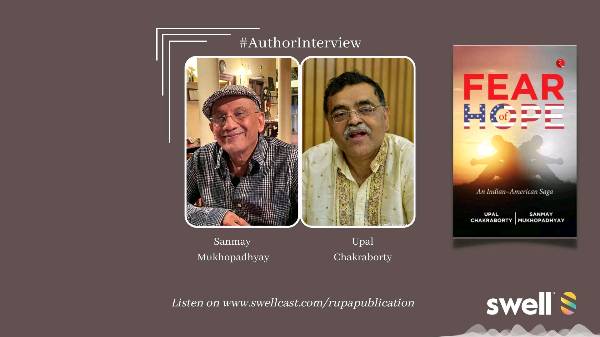
@RupaPublication
This is the official Swellcast of Rupa Publications. For more info, please visit: rupapublications.co.in
Fear of Hope | Authors Sanmay Mukhopadhay & Upal Chakraborty in Conversation.
Authored by Sanmay Mukhopadhyay and Upal Chakraborty, Fear of Hope is the saga of an Indian immigrant who ends up unable to rid himself of the fear of hope. Spanning across continents, the gripping narrative explores the human condition with a question at its core - is it possible for the Marxist philosophy of dialectical materialism to coexist with spirituality within the same individual?
Sanmay Mukhopadhyay
@Dr.Yogi · 5:00
This is Sanmay Mukhopadhyay..Question about thought processes. It's a long, long journey and it's very hard to communicate in five minutes. The idea of the novel, the process that developed, came into being into this novel called Fear of Hope. I left India a long time back, 40 years back. And my story has been been rather bizarre at times. I got into situations which a lot of people can't even believe that an educated techie would get in
Sanmay Mukhopadhyay
@Dr.Yogi · 4:49
I mentioned that, but I thought he would be and then we talked and he was very gracious to take this on a large portion of the work he has done by him not only in writing but also in ideas and thoughts he brought in his ideas add to this journey which started a long time back. And so why fear of hope?
upal chakraborty
@upalchak · 5:00
Of course we also had a left wing background in my family but I would still say Sean. I played a very active role in influencing greenhorns like us who had just come from schools. And I was from a very elite school, one of the most elite schools in Calgary since aviation school. But anyway, the environment was such that we all got sucked into it. And then of course things changed. I will not get into the details of that politics and story
Thank you so much. Sanmay and Upal. Very, very interesting to know how you both came together to collaborate on the book. My next question is to Sanmay, your character Samir is someone who is trying to make sense of what it means to be an Indian at heart and an immigrant in America, trying to make it big and ah, trying to live the American dream. Are his experiences in the book in some way influenced by your own experiences in the US? I'm really curious
Sanmay Mukhopadhyay
@Dr.Yogi · 5:00
Is it exactly the same? No. Does it have resemblances? Yes. People who know me and read the book, they have asked me the same question as you have. It's a fiction. It's a work of fiction. Otherwise I would have called it or we would have called it an autobiography. It's not an autobiography. But there are a lot of influences, a lot of events, like the Memphis event. I think I spoke before, that I am an It person
Thank you so much for that. My next question is about the coveted American dream, which is an appealing idea to so many people because we are taught to believe that it's possible to remake ourselves entirely, to come up from nothing and end up rich or famous or wildly successful. So, according to you, what makes this dream so compelling for your characters in the book and for also contemporary Indians that you know
Sanmay Mukhopadhyay
@Dr.Yogi · 5:00
At that point, my goal was to live a decent, normal life where I can express myself, where I can talk about myself. A decent life. I was never very ambitious. And if you see the character, show me also. He's not overly ambitious from a monetary point of view. Why will he be practicing yogi after all that? Most of the yogis, I don't know whether you know it or not, most of the yogis in America are poor people
Sanmay Mukhopadhyay
@Dr.Yogi · 5:00
I think it has to do with destiny, with hands of providence, god, universal consciousness, whatever you call it. I truly believe, and I always believed that in my life around from my childhood, my family was spiritual politically aware, but spiritually conscious and different grades and shades of it. My dad was a highly spiritual but a highly left or center politician. He actually was involved in a lot of political movements
upal chakraborty
@upalchak · 4:53
Possibly you have a Nobel laureate sipping coffee in the corner of the cafeteria. Your own guide would be someone very well known in that field, even if he's not a Nobel laureate. And so the best kind of environment attracts people so that's for the brilliant 1% of the population, then we have those who go to the corporate world. As such
Swell Team
@Swell · 0:15
upal chakraborty
@upalchak · 4:57
And then slowly he kind of then the general lack of warmth. No one ever asked him whether he's having any problems settled down, which we do. If there's a white who comes here, the first thing we do is ask him whether he's comfortable in the hotel. I mean, I've had a lot of people coming over from my parent company both in the UK and the USA
Thank you so much, Upal for sharing your perspectives. It does help me put a lot of things in context when I look at the character arc of your protagonist in the book. So my next question to you is this with your corporate background, how did you get into writing, especially fiction? Was it something that was all along in your mind, or was it just happenstance that got you into writing?
upal chakraborty
@upalchak · 5:00
Shoddy had some manuscripts and after we got in touch, after many, many years, those manuscripts he one day sent me and said how do you like it? So I said, yeah, good. It's a very good account. This manuscript basically consisted of his experiences in the US. His racist experiences, plus the two things which I remember
upal chakraborty
@upalchak · 4:58
Okay, let me clarify. It was just where am I? Impossible to even forget, write it, even think of pending a novel. During my corporate days, it was just impossible for the very simple reason that though we call it a nine to five job, it is actually a nine to five dying job. I don't remember a single evening when I came home before 830
upal chakraborty
@upalchak · 2:00
So that's how various characters were conceived of, various incidents were conceived of. And it made good progress during the pandemic. And finally, it took some shape. This one, the suspense element in the thing came up. It's a very interesting thing during one of our discussions with a very senior person in Rupa, and he just casually mentioned, it's a good novel. I like it. I like the language, I like the story
Sanmay Mukhopadhyay
@Dr.Yogi · 5:00
There are some border areas where people it's like a no man's land and those areas could be properly could be a proper place for somebody like Show Me to be captured and put in. So those were the sound ideas that went in now in USA. So the England part I believe upon came with his experiences on that the whole of England
Sanmay Mukhopadhyay
@Dr.Yogi · 5:00
And then there were some imaginatory stuff that might have gone in and these also came from a collective consciousness. It's not just only the authors. When the authors talk about their wives, their friends, their circles, they talk about this place that but it sticks into the deeper balance sets of authors and they bring it out at some point. So group consciousness works also when we are writing. So that's one thing
upal chakraborty
@upalchak · 4:51
He feels nostalgic at night on those lonely nights for those nights at Calcutta when the noisy city of Calcutta where the vagrants would sorry. The stray dogs would call the neighbors would be awake till quite late night discussing, debating or even arguing till late night. His overall the overall ambience of the place, if I may call it even the azaran early morning azaran. So all that had sort of entered his psyche, his subconscious. And naturally, it did play a role
upal chakraborty
@upalchak · 5:00
And I'm sure the liberal at Positive Los Angeles Los Angeles is known to be a liberal city, or if I may call it a left of center city. Plus it's a city where the immigrant community is much stronger than, let's say, the heartland of America, cincinnati or Virginia or Iowa or wherever. So Los Angeles also has a character of its own and I'm sure that is also kind of playing on him
And for our listeners, I'm going to be sharing the Amazon Book link for the book Fear of Hope in the description. Please do check the book out. It comes highly recommended. And if you do have any questions for either Sanmay or Upal, please leave them here. And thank you so much for listening in
upal chakraborty
@upalchak · 1:09
So that's how he got influenced and he assumed Ultraright position, which, according to me, is not something I personally would like to countenance for the very simple reason that I have still not changed my positioning within the spectrum. And many others have also. Not only a few have. So this kind of shift from one end of the spectrum to me is not something which I personally agree with. But anyway, I'm a particularly open person, so I thought that would let us explore the reasons

